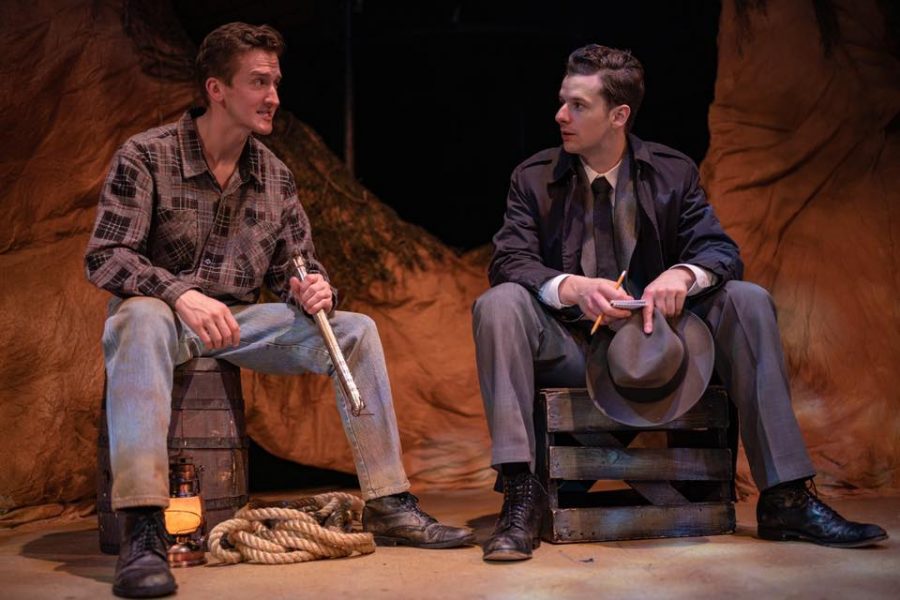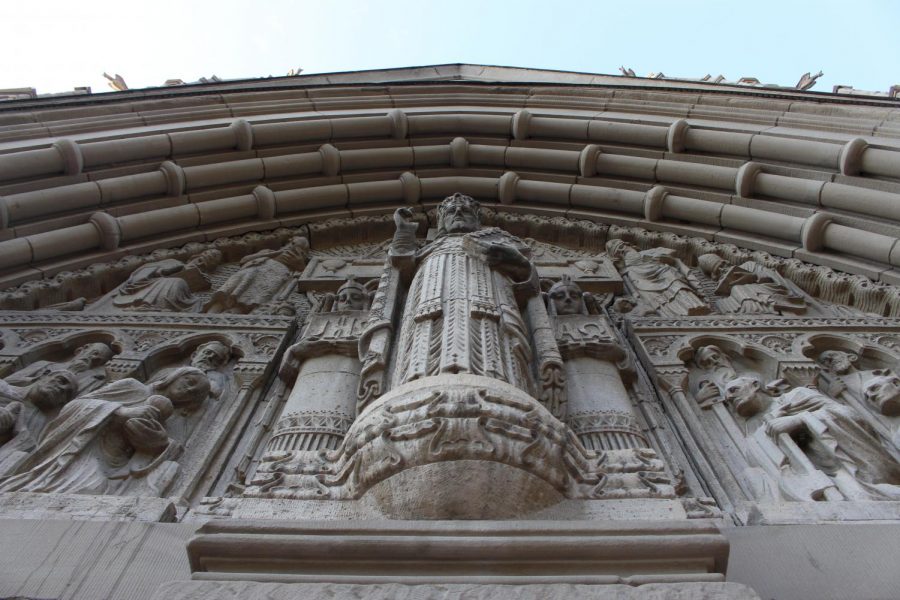’Floyd Collins’ Explores Financial Hardship and Emotional Connections from 50 Feet Under
Homer Collins (Chase Quinn) tells his story to Skeets Miller (Cameron Holzman) (Photo by Jibon Asib I Courtesy University of Utah Theatre)
February 15, 2020
For the majority of the University of Utah’s Department of Theatre’s lastest production, what lies between a rock and a hard place is literally the titular Floyd Collins.
Based on a true story, as a passionate cave explorer in the early 1920s, Floyd Collins (Derek DuBay) spends his time searching throughout Kentucky for the next cave discovery that could ease his family’s economic despair. Mammoth Cave brought unbelievable successes, and Collins wishes to capture the same economic gain to lift his family out of a recession. Yet, as he is trapped during one of his explorations, the Collins family must navigate the media and the commercialization of tragedy, all while Collins continues to wait for rescue 50 feet below his family.

While cave exploring proves to be a dangerous endeavor, Collins believes he is constantly on the brink of an incredible discovery, as he always has “the luck” with him. DuBay’s performance of Collins is captivating. Collins’ desire to find the next big thing is charming, but it borders on a hubristic pursuit. Collins almost seems to have a tunnel vision that is solely focused on lifting his family out of hardship, and he can only see cave explorations as the way to do so. Despite knowing the dangers, Floyd’s persistence is endearing — even though it might be easy to expect a fatal consequence.
Throughout the production, which is directed by Denny Berry, the relationship between Collins and his sister Nellie (Fiona Hannan) is fascinating and charming. Nellie tells one of the reporters that Floyd is “always saying we’re a fine pair, ’cause my heads in the clouds and his is in the dirt.'” Throughout the play, there are references that suggest Nellie has recently returned from a stay in a psychiatric hospital. Given that the play is set in the 1920s, the psychiatric help Nellie would have received might not have been the most effective care. Yet, as Floyd withers away within the cave, the two share a special bond that transcends the physical distance separating the two. They are truly kindred spirits, and Floyd seems to be the only one that understands or tries to understand Nellie.

Almost immediately upon the realization that Collins is stuck within the cave system, a reporter, “Skeets” Miller (Cameron Holzman), ventures out to the rural Kentucky town to break the story. Yet, as Collins’ circumstances draw attention, more reporters descend, twisting everyone’s words, falling into misinformation and “clickbait”-esque stories. The reporters are ravenous in their attempts to share a remarkable story with the world, but as they do, so a media circus breaks out upon the grounds.
While Collins did want to create a tourist attraction, the commercialization of his tragedy leads his family to sell his belongings as they are similarly berated by reporters to share stories of his upbringing. The media circus is eerily reflective of today’s world of misinformation and fake news, but it offers an interesting lens to the growing despair and lack of hope that resides within each of the Collins family members.
Aside from the captivating narrative and talented actors, the stage design itself, from scenic designer Kiersten Farley, is impressive and demands attention. The ground of the stage is utilized to showcase the above-ground world, while ladders, rock formations and slides that reach towards the ceiling and frame the stage represent the intricate cave system that Collins resides within for the majority of the production. As other characters who venture into the caves and attempt to rescue him, they inch along the precarious stage set up — reflecting the danger that Floyd regularly encounters in his cave explorations.

As a musical, the songs and dances that intersperse “Floyd Collins” offer new insights into the characters’ relationships and the ways in which they cope — or fail to cope — with their new reality. (The music is by Adam Guettel and the lyrics are by Guettel and Tina Landau.) While Collins is trapped within the cave, his character is able to occasionally escape, and his duet with his brother — Homer Collins (Chase Quinn) — presents an air of nostalgia and reconnection as they sing and dance together. Combined with the bluegrass and Americana influence to the production’s music, the atmosphere of “Floyd Collins” transports the audience to rural Kentucky and the deep caverns that take Floyd hostage.
“Floyd Collins” will be running until March 1 at Babcock Theatre in the Pioneer Memorial Theatre. Entry is free for University of Utah students with their U Card, tickets for faculty and staff are $15 and general admission tickets are $18.












